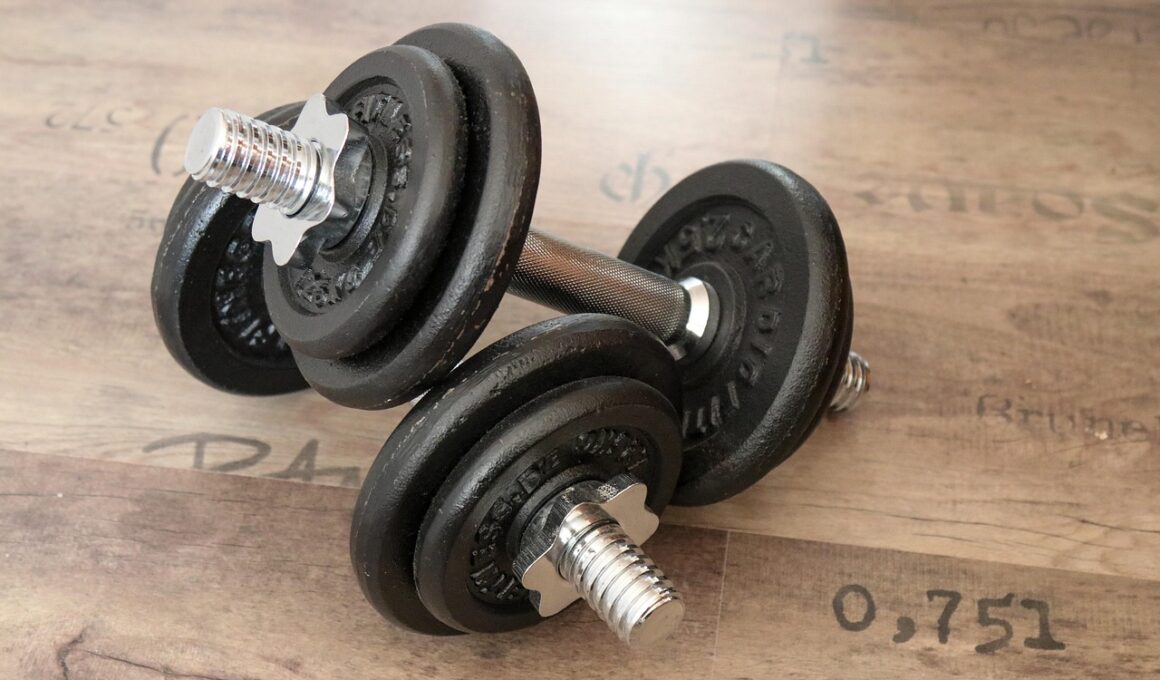Mental Techniques to Enhance Recovery and Prevent Burnout
In bodybuilding, mental techniques are as crucial as physical training. Committing to a routine often leads to intense physical stress. However, adopting effective psychological recovery methods can aid athletes significantly. Understanding the importance of mental recovery fosters sustained motivation and resilience. Visualization, for instance, creates a powerful mental image of desired outcomes. This technique assists in achieving goals by reinforcing positive habits. Additionally, mindfulness can help manage stress, which affects overall performance. By being present during workouts, it becomes easier to assess physical limits and avoid overtraining. Furthermore, incorporating relaxation techniques, such as yoga or meditation, can enhance mental clarity. In the long run, these practices promote recovery and prevent burnout. Keeping a positive mindset is essential, as self-talk influences performance greatly. Encouraging phrases can uplift spirits, while negative thoughts can quickly lead to discouragement. Therefore, practicing gratitude and visualizing success can shift focus from fatigue to achievement. Athletes must acknowledge their hard work and allow themselves time off when necessary. Remember, prioritizing mental health is as vital as lifting heavier weights. Mastering these techniques ensures optimal performance and recharged energy.
Another crucial mental technique involves goal setting. Defining clear, achievable goals provides direction in training. It’s essential to differentiate between short-term and long-term goals to maintain motivation. Short-term goals give immediate gratification, while long-term aspirations encourage a broader vision of success. Tracking progress offers tangible evidence of improvement, reinforcing commitment. Utilize tools such as journals or tracking apps to record workouts. This not only helps in recognizing growth but also encourages accountability. Research indicates that athletes who document their journey often experience reduced burnout. They develop a sense of achievement, further motivating them to push through challenges. Moreover, social support is crucial in sustaining mental health. Engage with peers for encouragement or join groups that share similar goals. Surrounding yourself with positive influences boosts morale and diminishes isolation. Additionally, taking active recovery days plays a vital role in mental renewal. Engaging in light activities like walking or swimming on off days can rejuvenate both body and mind. Finally, listening to your body is paramount. Understanding personal limits and respecting recovery signals play significant roles in preventing burnout. Balancing intense workouts with mental recovery techniques is the key to sustained success.
Importance of Positive Self-Talk
Positive self-talk is a powerful tool in sports psychology, particularly in bodybuilding. When athletes cultivate a habit of speaking kindly to themselves, they significantly bolster confidence and focus. Affirmations can reshape thoughts, making a profound impact on performance and well-being. Phrases like “I am strong” or “I can do this” plant seeds of determination within the mind. Over time, these affirmations gradually eliminate negative self-doubt. However, it’s crucial to implement this technique consistently. Regular practice in both training and recovery scenarios helps instill a positive mindset deeply. Moreover, it prepares the mind for competitive scenarios, reducing anxiety. Additionally, developing a routine that includes affirmations can enhance their effectiveness. Consider starting or ending each training session with these empowering phrases. The integration of such techniques encourages athletes to develop resilience amid challenges. Importantly, it’s essential to challenge negative thoughts whenever they arise. Instead of allowing discouraging feelings to linger, reframing them can maintain a positive outlook. In conclusion, positive self-talk promotes a more empowering mental environment, crucial in driving success. Bodybuilders should embrace these techniques wholeheartedly to ensure they remain motivated and focused on their goals.
Another impactful strategy is the practice of visualization techniques. Visualization involves creating a vivid mental image of achieving desired outcomes. This technique is not only prevalent among elite athletes but also essential for bodybuilders seeking significant improvements. Engaging all senses during visualization can enhance its effectiveness. Picture the complete experience of lifting weights, feeling the muscles work, and even hearing supportive gym sounds. Research supports that mental imagery positively influences actual performance. Athletes who visualize their workouts often witness improved muscle engagement and technique during training. Therefore, dedicating a few minutes each day for visualization can yield substantial benefits. Furthermore, incorporating specific imagery related to recovery enhances relaxation and mental clarity. Visualizing the body healing and rejuvenating itself significantly reduces stress levels. This practice can also help bodybuilders prepare mentally for competitions, enabling them to face challenges calmly. Establishing a routine around visualization before workouts or competitions provides comfort and assertiveness. As athletes progressively connect visualization with physical activity, taking on challenges seems less daunting. Thus, adopting this mental technique is imperative. Harnessing the power of imagery fosters enhanced performance and effective recovery.
Building a Support Network
The importance of a supportive community cannot be overstated in bodybuilding. Surrounding yourself with like-minded individuals fosters both accountability and encouragement. Engaging with others in the fitness community provides emotional support, which is vital in maintaining mental health. Bodybuilding can often feel isolating due to the dedication and sacrifices it demands. Therefore, establishing connections helps alleviate feelings of loneliness. Consider joining bodybuilding classes, forums, or online communities that focus on shared goals. In these spaces, individuals can share experiences and strategies for overcoming challenges. Open discussions about mental health among peers dismantle stigma surrounding such topics. Moreover, surrounding oneself with positivity is essential for growth. Supportive friends and fellow athletes can provide constructive feedback while celebrating achievements. Moreover, accountability partners help each other stay on track, ensuring consistent training. Sharing goals with a trusted friend creates a sense of commitment, motivating bodybuilders to remain dedicated. It’s vital to seek out those who inspire and uplift, as their positive energy can boost mental resilience. Overall, community plays a significant role in ensuring ongoing motivation while avoiding burnout. Building a strong support network is indispensable in achieving muscle-building goals.
In addition to the psychological techniques discussed, taking breaks is crucial for both mental and physical recovery. Athletes often feel the need to constantly push through training sessions without pause. However, allowing time for rest is vital to prevent burnout. Schedule regular rest days to give both body and mind opportunities to recover. This time should be spent engaging in activities that bring joy, like hobbies or spending time with loved ones. Engaging in leisure activities fosters a more balanced lifestyle, which is essential for mental health. Moreover, practicing gratitude plays a pivotal role in maintaining a positive mindset. Recognizing the accomplishments achieved can help to reframe challenges in a constructive light. Keeping a gratitude journal can also be beneficial; jotting down daily achievements and positive experiences fosters a sense of fulfillment. Furthermore, combining training with light social activities deepens connections between peers. Having fun while training prevents workouts from feeling monotonous, enhancing mental engagement. Therefore, while dedication is essential in bodybuilding, learning to balance hard work and leisure can lead to healthier mindsets. Embracing this balance can also result in greater longevity in training and life.
Embracing Mindfulness Practices
Finally, embracing mindfulness practices is key to enhancing recovery in bodybuilding. Mindfulness encourages a focus on the present moment, which can be particularly beneficial during intense training sessions. By paying attention to breathing and bodily sensations, athletes cultivate a deeper connection with their bodies. This practice helps to prevent injuries by heightening awareness of fatigue levels, enabling bodybuilders to avoid overexertion. Mindfulness can also help manage anxiety and stress, common experiences in high-performance environments. Engaging in mindful meditation, even for short durations, aids in mental clarity. Experiences such as yoga integrate mindfulness into physical movement, promoting flexibility alongside mental focus. Such techniques not only enhance recovery but foster a positive mental attitude towards training. Importantly, consistency in practicing mindfulness breeds long-lasting benefits. Taking a few minutes daily to meditate or reflect can enhance overall mental health significantly. Athletes should incorporate mindfulness into their routines to reap maximum benefits. Making a habit of these techniques ensures sustainable progress and enhances enjoyment in training. By recognizing the power of mindfulness, bodybuilders can improve their mental well-being while striving for their physical goals.
In summary, integrating mental techniques into bodybuilding training is essential for achieving success. From positive self-talk, visualization to building a supportive network, the focus on mental health cannot be overlooked. Athletes must remember that maintaining a psychological balance is crucial in their journey. Rest and recovery, coupled with effective mental strategies, leads to sustained performance. Recognizing personal limits and prioritizing mental wellness is vital for long-term achievement. Moreover, mindfulness practices enhance recovery while promoting mental resilience among bodybuilders. Ultimately, a well-rounded approach combining mental and physical training yields comprehensive benefits. Athletes should embrace these techniques whole-heartedly for successful bodybuilding journeys. By fostering a positive mindset, bodybuilders enhance not only their physical prowess but also enrich their overall lives. Achieving balance in all aspects of training is the ultimate goal, ensuring both body and mind thrive. This balanced approach leads to greater satisfaction, improved performance, and long-term growth in the world of bodybuilding.


